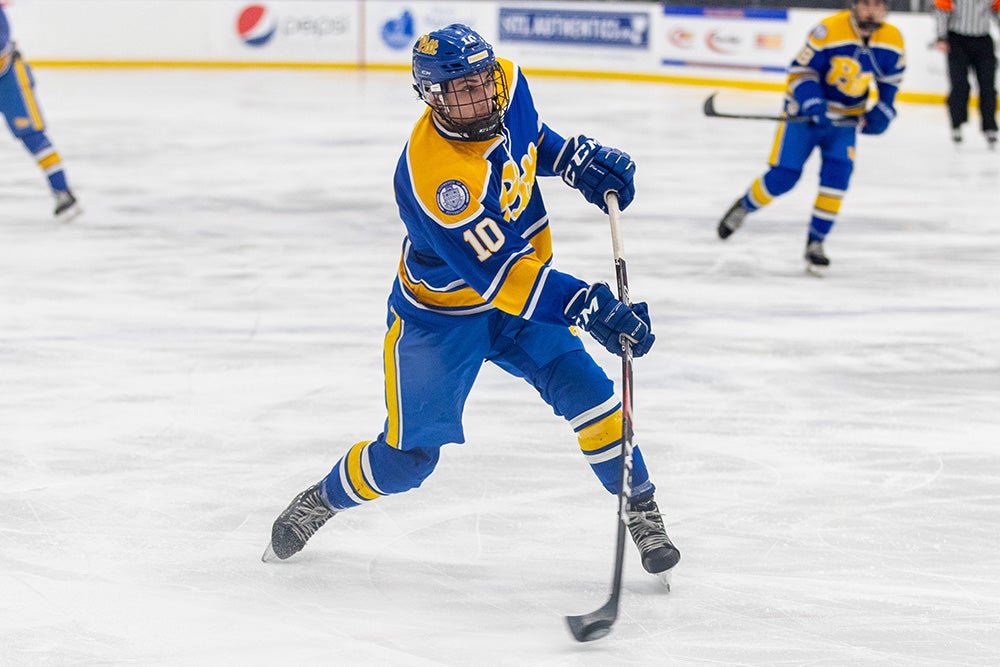
Subscribe to Pittwire Today
Get the most interesting and important stories from the University of Pittsburgh.Benjamin Leslie is a star on and off the ice.
The formidable forward on Pitt’s men's ice hockey team has scored 112 points over his 91-game career. Although hockey is a University club sport, the team competes with Division 1 of the American Collegiate Hockey Association, the highest level of non-varsity collegiate ice hockey in the nation that offers men's and women's divisions.
As the 2023 year came to a close, the team won the season's Eastern States Collegiate Hockey League tournament and received its highest ranking in program history, coming in at No. 9.
In between practice and traveling for games, Leslie also manages 18-credit semesters and research on congenital heart defects (CHD).
Leslie works in the Wagner/D'Amore Cardiovascular Engineering Lab in the McGowan Institute for Regenerative Medicine researching CHD valve malformations that can result in heart or valve infections, irregular heartbeats, blood clots, heart failure and strokes. He’s especially concerned about the littlest patients experiencing these symptoms.
“For these kids, childhood often means a lot of time in the hospital undergoing major cardiac procedures,” he said. “When I was a kid, I wanted to have fun and run around with my friends. To not to be able to enjoy any high-intensity activity or sport, let alone hockey, I can't imagine how awful that must be.”
Nearly 40,000 babies per year are born with CHD, making it one of the most common congenital disorders. While valve replacements and surgical procedures can address malformations, the fixes are usually temporary — parts break down or clog and children eventually outgrow them. In addition, medications to help manage CHD often have serious side effects like heavy bleeding.
Leslie wants to find a way to fix these faulty valves once and for all.
To do so, he spent his first year at Pitt getting to know professors, reading their published work and meeting graduate students exploring the topic. The more he read and learned, the more intrigued he became with cellular engineering.
Valves made from patients’ own tissues, like those Leslie studied in the Wagner/D'Amore lab, can grow as the patient does, thus decreasing the number of surgeries patients need.
“Additionally, by being made from the patient’s own cells, the need for blood thinners would not be required,” said Leslie. “Therefore, children would be able to partake in sports like every other kid, without the risk of bleeding. This could give every kid a chance.”
The challenges are many: heart valves open and close millions of times per year and change shape while they do so, so imitations need to be durable and flexible. Temporary scaffolds that could help tissue seed and grow need to be sterile and not introduce infection. And lastly, the actual process of implanting the engineered valves needs to be flawless.
In his sophomore year, Leslie focused on researching the ways these types of valves could decrease the likelihood of problems like calcification and improve heart function. Drake Pedersen, a doctoral bioengineering student, supervised Leslie in the lab.
“He was very curious to hear about what we do, but more so about why what we do matters,” said Pedersen. “His eagerness to learn about the impact of our research was indicative of the type of student I appreciate training.”
By Leslie’s junior year, Pedersen was entrusting him to run experiments and recommending him for co-ops.
“I'm not sure where Ben’s path will take him, but I feel he would excel wherever he goes,” Pedersen said.
Leslie says medical school is on his radar, but for now, he’s focusing on his final year of school and season — and potentially coaching in the future. “My coaches have impacted who I am as a person and decisions I’ve made for hockey and off the ice. That’s something I would love to do for other kids,” Leslie said.
He’s got plenty to show them.
“He has one of the quickest shots of any kid I have ever coached,” said Pitt men’s ice hockey head coach Stu Rulnick, who was named the 2022 College Hockey Mid-America Coach of the Year. “He is one of our team captains and certainly one of those kids that leads by example, on and off the ice.”
— Kara Henderson, photography by Aimee Obidzinski and Pitt Athletics. This story has been updated to reflect Leslie's correct graduation date.



